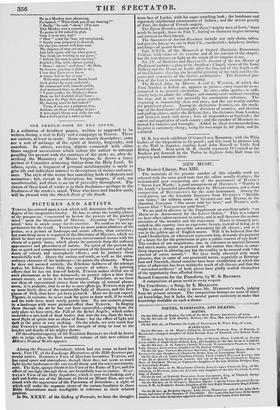NEW MUSIC.
The Musical Library, Part XIII.
The materials of the present number of this valuable work are selected with the same good taste that the editor usually displays ; the
instrumental part comprizing one of the movements of HAYDN'S
" Seven Last Words," a good arrangement of HANDEL'S " Worthy is the Lamb," a beautiful pianoforte duet by MENDEI.SSOIIN, and a short composition of BEETHOVEN'S for the same instrument. Among the vocal pieces, arc the favourite Romance from Husisum's " Matilde von Guise," the solitary union of SIIAKSPEAIIE and linvos, in the charming Canzonet " She never told her love," and AVEBBE'S well- known Glee " You gave me your heart." We are glad to observe in the Supplement an excellent article "on Music as an Amusement for the Lower Orders." This is a subject
we have often taken occasion to notice, and it well deserves the serious
attention of the moralist and the statesman. Music is strangely per- verted in this country into an expensive luxury, instead of being, as it
ought to be, a cheap, accessible amusement for all classes ; and as it was in the golden age of English music. Will it be believed that the Lord Chamberlain, or whosoever represents him, demands the payment
of a heavy fee for the permission to give a public concert of any kind ?
The conduct of our magistrates, too, in reference to musical licences and street music, seems to proceed on the notion that there is some-
thing improper in allowing any but the wealthy to be amused with "the concord of sweet sounds." We have lately observed with much pleasure, that in some of our provincial towns, especially at Birming- ham and Norwich, choral concerts have been established, at which the price of admission has been within the reach of all classes, and that the " unwashed artificers " of both places have gladly availed themselves of the opportunity thus afforded them.
Second Concerto for the Pianoforte, by W. S. BENNETT.
A composition of great merit in every respect.
The Crucifixion ; a Song, by E. MERRIOTT. The subject of this song is above Mr. MEaaroTT's reach, judging from his present attempt. The composition betrays no want of musi- cal knowledge, but it lacks the mental power necessary to make that knowledge available on such a theme.


























 Previous page
Previous page